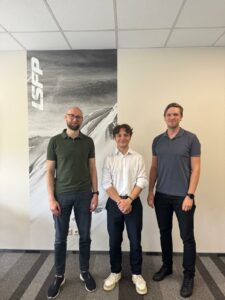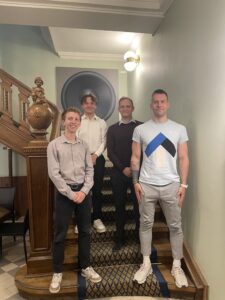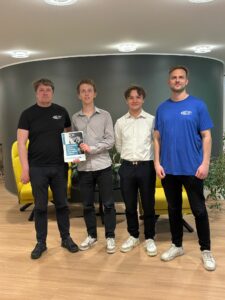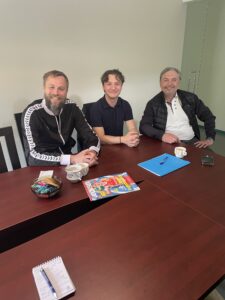EASE Deepens Its European Engagement through Bilateral Meetings in Latvia and Estonia
From Riga to Tallinn, building new bridges to support social responsibility in sport
In line with its ongoing strategy to promote inclusive, ethical, and socially responsible employment practices in the European sport sector, EASE continues to pursue its European mobility program. Through this initiative, EASE travels across the continent to present its mission, strengthen partnerships, and disseminate the European Social Charter for Sport Events, a key legacy tool born out of the Erasmus+ project and the momentum of Paris 2024.
The Charter aims to ensure that sport events, whether grassroots or elite, are organized in ways that respect fundamental social principles, including equality, accessibility, and workers’ rights. These mobility actions contribute not only to sharing this vision but also to engaging local actors in co-constructing a more sustainable and inclusive European sport model.
The latest stage of this European tour brought EASE to two vibrant capitals in the Baltic region: Riga and Tallinn. Both cities offered rich opportunities to interact with forward-thinking stakeholders committed to advancing sport in line with European values.
Riga, Latvia – Strategic Dialogue with the Latvian Sports Federation Council (LSFP)
The Latvian leg of the mobility took place in Riga, where EASE had the privilege of meeting with representatives of the Latvian Sports Federation Council (Latvijas Sporta federāciju padome, LSFP). As the umbrella organization for over 90 Latvian sports federations, LSFP plays a pivotal role in shaping the direction of sport policy in the country.
Founded in 1992 and recognized by the Latvian government, the LSFP acts as a crucial intermediary between public authorities and sport federations, serving both as a coordinating body and an advocate for sport development. Its main functions include the allocation of state funding, oversight of athlete development programs, and the promotion of good governance in sport.
The meeting allowed for a comprehensive exchange on the Latvian sport system — its institutional architecture, governance mechanisms, and priorities in terms of grassroots and elite sport development. The LSFP’s strategic positioning and close relationship with the Ministry of Education and Science position it as a natural partner for disseminating the European Social Charter for Sport Events across Latvia.
For EASE, this meeting marked an important step in understanding the specificities of Latvian sport employment, including volunteer management, dual career systems, and the support structures available to athletes and coaches. It also opened new pathways for future collaboration in areas such as capacity building, education, and Erasmus+ partnerships.

Tallinn, Estonia – Multi-Level Engagement in the 2025 European Capital of Sport
The second part of the mobility led the EASE team to Tallinn, the capital of Estonia, a country where sport plays an increasingly important role in national and local policy. Tallinn has been named the European Capital of Sport 2025 by ACES Europe, an opportunity the city is seizing to reinforce its commitment to accessible and inclusive sport for all.
1. Ministry of Culture – Public Policy in Support of Sport
The first engagement in Tallinn was with the Ministry of Culture of Estonia, which oversees sport among its portfolios. This high-level meeting offered an overview of Estonia’s public sport strategy, including its priorities for sport education, youth participation, infrastructure, and support for federations and clubs.
EASE gained valuable insights into how Estonia integrates sport into its national health agenda, its ambitions for increasing public participation in physical activity, and its approach to managing public-private cooperation in sport. The Ministry also provided data on citizen participation, with over half of the Estonian population regularly engaging in sport — a remarkable figure in the European context.
This exchange laid the groundwork for EASE to initiate dialogues on sport employment frameworks, the professionalization of sport careers, and the promotion of social principles in the organization of events.

2. Tallinn 2025 – A City Mobilized for Physical Activity
Next, EASE met with the organizing team behind Tallinn 2025 – European Capital of Sport, a project run by the city of Tallinn in collaboration with ACES Europe. The city is using this title as a launchpad for bold and creative initiatives to increase sport participation across all demographics.
Among the flagship programs is the « Sport of the Month » campaign, which promotes one sport discipline each month, encouraging residents to try new physical activities with the support of elite athletes and local clubs. These campaigns not only foster community engagement but also allow the city to support underrepresented sports and target diverse age groups.
The Tallinn 2025 team emphasized their openness to European cooperation projects and expressed great interest in the European Social Charter for Sport Events, which they see as a practical and ethical framework to guide the legacy of the Capital of Sport year.

3. Tallinn Sports Clubs Federation (Tallinna Spordiliit) – Grassroots Power
Finally, EASE held a productive session with the Tallinn Sports Clubs Federation (Tallinna Spordiliit), the coordinating body for sport clubs in the Estonian capital. Representing a wide array of disciplines, the Federation works to support clubs with training opportunities, infrastructure access, and event coordination.
Tallinna Spordiliit is particularly active in organizing events for youth and recreational athletes, making it a key stakeholder in implementing the European Social Charter at the grassroots level. The meeting enabled the identification of potential collaboration areas — including joint Erasmus+ projects, volunteer training modules, and awareness-raising campaigns about social rights in sport.
As local sport clubs are the main operational actors of sport delivery, working closely with the Federation enhances the Charter’s reach and long-term impact.

Next Steps – Turning Mobility into Long-Term Cooperation
The visits to Latvia and Estonia proved to be highly strategic for EASE’s European agenda. They allowed for the creation of new partnerships and offered key learning opportunities about the regional specificities of sport employment, governance, and community involvement.
Moving forward, EASE aims to integrate these insights into its future actions, continuing to support a European sport model that is fair, inclusive, and socially responsible. The organization will work to establish cooperation agreements with the institutions met during the mobility, and will explore avenues for collaborative projects under the Erasmus+ and European Social Fund frameworks.
Through these efforts, EASE not only reinforces its presence in the Baltic region but also strengthens its commitment to building a truly European network of sport employers and stakeholders bound by shared social values.